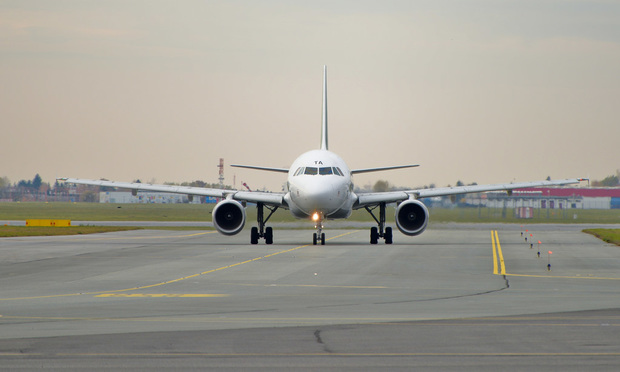Commonwealth Court Revisits Workers' Compensation's 'Premises Liability'
Normally, work injuries arise when an employee is injured on or off the employer's premises, while actually engaged in furtherance of the employer's business or affairs. Last week, in US Airways v. Workers' Compensation Appeal Board Bockelman, No. 612 C.D. 2017, the Commonwealth Court revisited the less common compensability of a workers' compensation claim based on a premises theory of liability.
March 01, 2018 at 04:36 PM
7 minute read
 Airbus plane.
Airbus plane.
Normally, work injuries arise when an employee is injured on or off the employer's premises, while actually engaged in furtherance of the employer's business or affairs. Last week, in US Airways v. Workers' Compensation Appeal Board Bockelman, No. 612 C.D. 2017, the Commonwealth Court revisited the less common compensability of a workers' compensation claim based on a premises theory of liability. The seminal case in such matters is Workers' Compensation Appeal Board in Slaugenhaupt v. U.S. Steel, 376 A.2d 271 (Pa. Commw. 1977), where the Commonwealth Court set forth a test which required a claimant to prove the injury occurred on the “employer's premises,” the claimant's presence on the employer's premises was required by the nature of the employment relationship, and the injury was caused by the condition of the premises or by operation of the employer's business on that premises.
“Employer's premises” is in quotes since the courts have held that the concept of premises is different from that of property. In other words, the area in question is the “employer's premises” if it is either owned, leased or controlled by the employer and is so connected with the business of the employer as to form a component or integral part of it. Much to the benefit of the injured worker, the Bockelman court has continued a trend of expanding what it means to be on an employer's premises.
The claimant in Bockelman worked for employer US Airways as a flight attendant, based in Philadelphia. Since US Airways does not give its employees any directive at all regarding how they should commute to work, the claimant chose of her own accord to drive herself with her own vehicle to the airport and park in one of the two designated employee parking lots, neither of which are owned or controlled by US Airways. Both parking lots are owned, operated, and maintained by the city of Philadelphia for use by anyone who works at the airport. The lot was not exclusive to US Airways. Parking in those lots is by no means required by the employer. From there, the claimant takes a shuttle bus to the US Airways terminal to report for work. As with the lot itself, US Airways does not own or exercise control over the shuttle buses in any way. The claimant also uses the shuttle bus on her return trip home, after the return flight.
On the date of injury, the claimant came to work and left in her usual manner. After the return flight, the claimant boarded the shuttle bus to return to the parking lot when she badly injured her left foot slipping on water while attempting to lift her suitcase onto the luggage rack. As US Airways denied compensability, asserting the claimant was not in the course and scope of her employment at the time of the injury, the claimant filed a claim petition which was granted 10 months later. The workers' compensation judge (WCJ) concluded that the claimant had sustained injuries in the course and scope of her employment since: “the injury occurred on the employer's premises; the claimant's presence on the shuttle bus was required by the nature of her employment; and the injury was caused by the condition of the premises.”
The Workers' Compensation Appeal Board affirmed the WCJ's decision and the matter was brought for review by the employer before the Commonwealth Court. On appeal, the employer argued that the claimant's injury did not occur on the employer's premises because US Airways “did not own, lease, or control the shuttle bus and parking lot, and they were not integral to the employer's business.” The employer also argued that the claimant's presence on the bus was not required due to her employment status, because the employer never required the claimant to use the shuttle bus.
Regarding whether the injury occurred on the employer's premises, the Commonwealth Court analogized the instant fact pattern to Interstate United v. Workers' Compensation Appeal Board, 424 A.2d 1015 (Pa. Commw. 1981), and Fashion Hosiery Shops v. Workers' Compensation Appeal Board, 423 A.2d 792 (Pa. Commw. 1980). In both cases, the court considered a “means of access customarily used by employees for ingress and egress” to be such an integral part of an employer's business as “to be considered part of the premises.” In Interstate United, the means of access was a footbridge. In Fashion Hosiery Shops, it was a walkway. While in Bockelman, the claimant's “means of access” to enter and exit the workplace was the airport parking lot and shuttle bus, rather than an entrance-way of some kind, the court, nonetheless, found the shuttle bus to be analogous to the footbridge and walkway. While it was undisputed that the employer did not own or exercise control over the parking and shuttle services, the court found that by doing business with the airport, US Airways “understood” that the airport would transport US Airways' employees who drove to work. Specifically, the court found consistent with the aforementioned case law that the shuttle bus was such an integral part of the employer's business that it was a part of the premises since it was a customary means of ingress and egress by its employees. The employer's title to or control over the area was irrelevant.
Having concluded that the shuttle bus was part of the employer's premises, the court turned to the even more thorny issue of whether the claimant was “required” to be on the employer's premises where she was injured due to the nature of her employment. Quite logically, the employer argued that the injured worker was not required to be on the shuttle bus US Airways gave no directives whatsoever to its employees as to where to park and how to get to work. Essentially, it was the employer's position that the claimant chose to board the shuttle bus.
In dismissing the employer's argument, the Commonwealth Court found that the claimant's presence on the shuttle bus was, in fact, a necessary part of her employment. The court reasoned that because the shuttle bus was the means by which she traveled between her “work” at the terminal and the parking lot designated for airport employees, she was required to be there due to the nature of her employment. The court stated: “Claimant's utilization of the shuttle bus service was expected, so long as she elected to drive to work. Claimant's presence on the shuttle bus, therefore, was so connected to her employment relationship that it was required by the nature of her employment, and the WCJ did not err in concluding as such.”
While as a claimant's practitioner, I welcome the expanded coverage ushered in by Bockelman, it is also apparent that the court's analysis fails to adequately address the emphasized portion of the above quote. One would assume that employees could elect any means of commute to work. They are not required to drive. Were a claimant to take public transportation to the airport, as opposed to drive, could not a similar argument be made for the compensability of a bus accident or incident on the regional rail? And what would that argument do to the coming- and-going rule? Either way, Bockelman emphasizes that all “premises liability” workers' compensation claims must be analyzed closely, in light of the court's liberal construction of the law.
Christian Petrucci, of the Law Offices of Christian Petrucci, concentrates his practice in the areas of workers' compensation and Social Security disability. He also counsels injured workers in matters involving employment discrimination and unemployment compensation benefits.
This content has been archived. It is available through our partners, LexisNexis® and Bloomberg Law.
To view this content, please continue to their sites.
Not a Lexis Subscriber?
Subscribe Now
Not a Bloomberg Law Subscriber?
Subscribe Now
NOT FOR REPRINT
© 2025 ALM Global, LLC, All Rights Reserved. Request academic re-use from www.copyright.com. All other uses, submit a request to [email protected]. For more information visit Asset & Logo Licensing.
You Might Like
View All


AI and Social Media Fakes: Are You Protecting Your Brand?

Neighboring States Have Either Passed or Proposed Climate Superfund Laws—Is Pennsylvania Next?
7 minute readTrending Stories
- 1Dissenter Blasts 4th Circuit Majority Decision Upholding Meta's Section 230 Defense
- 2NBA Players Association Finds Its New GC in Warriors Front Office
- 3Prenuptial Agreement Spousal Support Waivers: Proceed With Caution
- 4DC Circuit Keeps Docs in Judge Newman's Misconduct Proceedings Sealed
- 5Litigators of the Week: US Soccer and MLS Fend Off Claims They Conspired to Scuttle Rival League’s Prospect
Who Got The Work
J. Brugh Lower of Gibbons has entered an appearance for industrial equipment supplier Devco Corporation in a pending trademark infringement lawsuit. The suit, accusing the defendant of selling knock-off Graco products, was filed Dec. 18 in New Jersey District Court by Rivkin Radler on behalf of Graco Inc. and Graco Minnesota. The case, assigned to U.S. District Judge Zahid N. Quraishi, is 3:24-cv-11294, Graco Inc. et al v. Devco Corporation.
Who Got The Work
Rebecca Maller-Stein and Kent A. Yalowitz of Arnold & Porter Kaye Scholer have entered their appearances for Hanaco Venture Capital and its executives, Lior Prosor and David Frankel, in a pending securities lawsuit. The action, filed on Dec. 24 in New York Southern District Court by Zell, Aron & Co. on behalf of Goldeneye Advisors, accuses the defendants of negligently and fraudulently managing the plaintiff's $1 million investment. The case, assigned to U.S. District Judge Vernon S. Broderick, is 1:24-cv-09918, Goldeneye Advisors, LLC v. Hanaco Venture Capital, Ltd. et al.
Who Got The Work
Attorneys from A&O Shearman has stepped in as defense counsel for Toronto-Dominion Bank and other defendants in a pending securities class action. The suit, filed Dec. 11 in New York Southern District Court by Bleichmar Fonti & Auld, accuses the defendants of concealing the bank's 'pervasive' deficiencies in regards to its compliance with the Bank Secrecy Act and the quality of its anti-money laundering controls. The case, assigned to U.S. District Judge Arun Subramanian, is 1:24-cv-09445, Gonzalez v. The Toronto-Dominion Bank et al.
Who Got The Work
Crown Castle International, a Pennsylvania company providing shared communications infrastructure, has turned to Luke D. Wolf of Gordon Rees Scully Mansukhani to fend off a pending breach-of-contract lawsuit. The court action, filed Nov. 25 in Michigan Eastern District Court by Hooper Hathaway PC on behalf of The Town Residences LLC, accuses Crown Castle of failing to transfer approximately $30,000 in utility payments from T-Mobile in breach of a roof-top lease and assignment agreement. The case, assigned to U.S. District Judge Susan K. Declercq, is 2:24-cv-13131, The Town Residences LLC v. T-Mobile US, Inc. et al.
Who Got The Work
Wilfred P. Coronato and Daniel M. Schwartz of McCarter & English have stepped in as defense counsel to Electrolux Home Products Inc. in a pending product liability lawsuit. The court action, filed Nov. 26 in New York Eastern District Court by Poulos Lopiccolo PC and Nagel Rice LLP on behalf of David Stern, alleges that the defendant's refrigerators’ drawers and shelving repeatedly break and fall apart within months after purchase. The case, assigned to U.S. District Judge Joan M. Azrack, is 2:24-cv-08204, Stern v. Electrolux Home Products, Inc.
Featured Firms
Law Offices of Gary Martin Hays & Associates, P.C.
(470) 294-1674
Law Offices of Mark E. Salomone
(857) 444-6468
Smith & Hassler
(713) 739-1250





